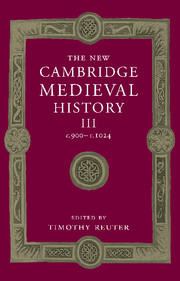Book contents
- Frontmatter
- 1 Introduction: reading the tenth century
- PART I GENERAL THEMES
- 2 Rural economy and country life
- 3 Merchants, markets and towns
- 4 Rulers and government
- 5 The Church
- 6 Monasticism: the first wave of reform
- 7 Intellectual life
- 8 Artists and patrons
- PART II POST-CAROLINGIAN EUROPE
- PART III NON-CAROLINGIAN EUROPE
- Appendix genealogical tables
- List of primary sources
- Bibliography of secondary works arranged by chapter
- Index
- Frontispiece
- Plate section
- Map 2: Archbishoprics and bishoprics in the early eleventh century
- Map 4: Germany
- Map 13: Byzantium in 1025
- References
4 - Rulers and government
from PART I - GENERAL THEMES
Published online by Cambridge University Press: 28 March 2008
- Frontmatter
- 1 Introduction: reading the tenth century
- PART I GENERAL THEMES
- 2 Rural economy and country life
- 3 Merchants, markets and towns
- 4 Rulers and government
- 5 The Church
- 6 Monasticism: the first wave of reform
- 7 Intellectual life
- 8 Artists and patrons
- PART II POST-CAROLINGIAN EUROPE
- PART III NON-CAROLINGIAN EUROPE
- Appendix genealogical tables
- List of primary sources
- Bibliography of secondary works arranged by chapter
- Index
- Frontispiece
- Plate section
- Map 2: Archbishoprics and bishoprics in the early eleventh century
- Map 4: Germany
- Map 13: Byzantium in 1025
- References
Summary
images of monarchy in the tenth century
Tenth-century churchmen emphasised the kingship of Christ, and made kingship Christ-centred. They called on the earthly king to be Christ’s special imitator. Like Christ, the king must willingly undergo travails: like Christ’s, a king’s service, even his humiliation, brought glory to him and well-being to his people. The theologians were also preoccupied with Antichrist. They pondered the end of time, scanning their natural environment for supernatural signs and portents. All of them believed that they lived during the Last of the Four Empires predicted by Daniel in the Old Testament. The Last World Emperor would, according to prophecy, establish a reign of peace, vanquishing the enemies of Christ. Then would follow the Last Days: the brief rule of Antichrist, and the Second Coming of Christ himself. These learned men were ecclesiastics, many of them monks. But they were in close contact with the secular world, and among the leading counsellors of kings and queens. When the learned produced political thought, monarchy dominated their speculations. Kings were frequently their addressees.
Monarchy could take the form of empire. Only in Italy perhaps, among western lands, was there still a sense of Constantinople as the imperial centre of the ‘Roman’ world. Elsewhere, imperial rule tended to be non-Roman, and defined in terms of rulership over a number of realms. While the Carolingian model inspired the Ottonian Reich, it had become clear by the close of the tenth century that the kings of the west Frankish realm recognised no imperial overlord. In Poland and Hungary, Otto III, strongly influenced by such learned tutors as Gerbert of Rheims, may have seen himself as summoning a new world of kings into existence to redress the balance of the old; but his attempt at a Roman ‘renovation’ was bound up with ecclesiastical reform and had eschatological dimensions. Kingship too could be viewed in apocalyptic perspective.
Keywords
- Type
- Chapter
- Information
- The New Cambridge Medieval History , pp. 95 - 129Publisher: Cambridge University PressPrint publication year: 2000
References
- 3
- Cited by



